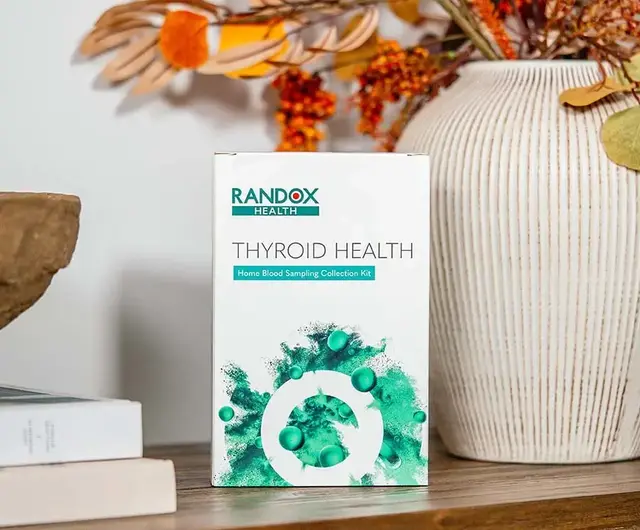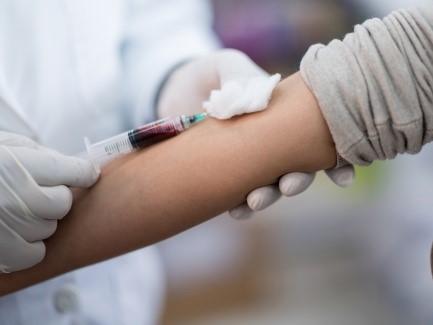Pruebas de la función tiroidea
Revisado por Dr Hayley Willacy, FRCGP Última actualización por Dr Toni Hazell, MRCGPÚltima actualización: 15 de septiembre de 2023
Satisface las necesidades del paciente directrices editoriales
- DescargarDescargar
- Compartir
- Idioma
- Debate
En esta serie:Glándula tiroides hiperactivaBocioEnfermedad ocular tiroideaGammagrafías tiroideas y pruebas de captaciónMedicamentos antitiroideos
Las pruebas de función tiroidea son análisis de sangre que ayudan a comprobar el funcionamiento de la glándula tiroides. Se utilizan principalmente para detectar una glándula tiroidea hipoactiva (hipotiroidismo) y una glándula tiroidea hiperactiva (hipertiroidismo).
Puede encontrar mucha información básica sobre la glándula tiroides en el folleto separado titulado Problemas de tiroides (que incluye también las glándulas paratiroides). Este folleto sólo trata del análisis de sangre que mide el funcionamiento del tiroides, no de enfermedades específicas, como la enfermedad de Graves, que afectan al tiroides.
Nota: la información que figura a continuación es sólo una guía general. Las modalidades y la forma de realizar las pruebas pueden variar de un hospital a otro. Una persona puede someterse a una prueba de la función tiroidea en un hospital y los resultados pueden ser ligeramente diferentes a los de otro hospital. Es importante interpretar los resultados de la prueba de la función tiroidea con el médico que la solicitó; por lo tanto, si la prueba fue solicitada por su médico de cabecera, él le dará el resultado. Si la solicitó un especialista del hospital, deberá obtener el resultado de él y su médico de cabecera no lo tendrá.
En este artículo:
Seguir leyendo
¿Qué es una prueba de la función tiroidea?
La prueba de la función tiroidea es un análisis de sangre que mide los niveles de las hormonas producidas por la glándula tiroides. La prueba también comprueba el nivel de una hormona producida por la hipófisis en el cerebro, que actúa sobre la glándula tiroides.
Las dos hormonas, la tiroxina (T4) y la hormona estimulante del tiroides (TSH), trabajan juntas y suelen estar equilibradas. En una persona sana, el cerebro produce la cantidad justa de TSH para mantener en funcionamiento la glándula tiroides. La glándula tiroides produce entonces la cantidad justa de tiroxina.
Es lo que se denomina un bucle de retroalimentación: si la glándula tiroides produce demasiada tiroxina, ésta retroalimentará al cerebro para que produzca menos TSH. Este diagrama muestra el bucle de retroalimentación entre la glándula tiroides del cuello y la hipófisis del cerebro:
Regulación de las hormonas tiroideas

¿Para qué sirven las pruebas de la función tiroidea?
Las pruebas de función tiroidea suelen realizarse para averiguar si la glándula tiroides funciona correctamente. Sirven principalmente para diagnosticar una glándula tiroidea hipoactiva (hipotiroidismo) y una glándula tiroidea hiperactiva (hipertiroidismo).
Las personas que padecen algunas enfermedades tienen un mayor riesgo de sufrir problemas tiroideos autoinmunitarios, por lo que se les suele recomendar que se sometan a pruebas de la función tiroidea todos los años. Estas enfermedades incluyen:
Algunos medicamentos también pueden afectar al funcionamiento del tiroides, como la amiodarona y el litio.
También se pueden realizar pruebas de la función tiroidea para:
Controlar el tratamiento con medicamentos sustitutivos del tiroides para las personas que padecen hipotiroidismo.
Comprobar la función de la glándula tiroides en personas que reciben tratamiento para el hipertiroidismo.
Examinar a los recién nacidos para detectar problemas hereditarios de la glándula tiroides.
Patrocinado
Análisis de tiroides en casa
Conozca su función tiroidea con un sencillo análisis de sangre en Randox Health. Las fluctuaciones de peso, los problemas para dormir y la sensibilidad al frío o al calor pueden ser indicativos de un trastorno tiroideo. Analizan 5 marcadores clave para ofrecerle una visión global de la salud de su tiroides.

Seguir leyendo
¿Qué ocurre durante una prueba de la función tiroidea?
Una prueba de la función tiroidea es un simple análisis de sangre. La muestra de sangre se envía al laboratorio para su análisis y los resultados se devuelven al médico que solicitó las pruebas. Los resultados suelen tardar entre 1 y 3 días en llegar.
¿Qué debo hacer para prepararme para una prueba de función tiroidea?
Las pruebas de la función tiroidea suelen requerir muy poca preparación. Cosas a tener en cuenta:
No necesita ayunar antes del análisis de sangre. Y no importa si ha tomado su medicamento para la tiroides justo antes del análisis de sangre.
Informe a su médico si está tomando alguna medicación, ya que algunos medicamentos pueden alterar los resultados de las pruebas y su interpretación.
También es importante mencionar si le han realizado alguna prueba de rayos X en la que se haya utilizado un medio de contraste especial, ya sea inyectado o si le han pedido que trague una pequeña cantidad de medio de contraste, ya que éste puede contener yodo, lo que puede afectar a los resultados.
Los niveles de sustancias químicas tiroideas (hormonas) también cambian en el embarazo, por lo que debe informar a su médico si está embarazada cuando se realice la prueba.
Nota: a todos los recién nacidos se les examina la función tiroidea como parte de la prueba de punción del talón que se ofrece a todos los bebés y se realiza cuando tienen 5 días de edad. Para más información, consulte el folleto sobre pruebas de cribado en recién nacidos.
Seguir leyendo
Explicación de los resultados de las pruebas de la función tiroidea
El tiroides suele cambiar lentamente. Casi nunca cambia rápidamente a hiperactiva o hipoactiva: suele tardar unas semanas como mínimo, o incluso unos meses. Si una prueba de la función tiroidea muestra que algo va mal, suele ser conveniente repetirla al cabo de 6-8 semanas. Esto se debe a que siempre existe la posibilidad de que la glándula tiroides vuelva a la normalidad por sí sola.
Lo segundo que hay que tener en cuenta sobre las pruebas de la función tiroidea es que los medicamentos, e incluso los remedios a base de hierbas o los suplementos vitamínicos, pueden afectar a la precisión de los resultados tiroideos.
Por estas dos razones, siempre es recomendable hacerse una prueba de la función tiroidea si se la recomienda un médico, en lugar de hacérsela de forma privada o sin que el médico se lo sugiera.
Rango normal
A continuación se indican valores aproximados de lo que es normal para los niveles de TSH y tiroxina. Son orientativos y varían de un hospital a otro.
Rango normal de la hormona estimulante del tiroides: 0,4-4,0 mU/L.
Rango normal de tiroxina: 9-24 pmol/L.
Así que, en general, si su TSH es baja y su nivel de tiroxina es alto, es posible que tenga una glándula tiroides hiperactiva.
Por el contrario, si su TSH es alta y su nivel de tiroxina es bajo, es posible que tenga una glándula tiroides hipoactiva.
Hay otras opciones como tener una TSH alta pero una tiroxina normal y eso puede indicar algo llamado hipotiroidismo subclínico. Si este es el caso, entonces también se puede solicitar una prueba de anticuerpos tiroideos, para ayudar con la decisión sobre si el tratamiento está indicado o no.
Tenga en cuenta que existen otras afecciones que pueden provocar anomalías en las pruebas de la función tiroidea (como la insuficiencia suprarrenal), por lo que las indicaciones anteriores son meramente orientativas: debe comentar sus pruebas de la función tiroidea con su médico antes de llegar a ninguna conclusión.
Recogida de pacientes para Análisis de sangre

Pruebas e investigaciones
Análisis de sangre
Las principales razones para conocer su grupo sanguíneo son si necesita una transfusión de sangre o si está embarazada. No puede solicitar un análisis de sangre solo para conocer su grupo sanguíneo en el SNS.
por la Dra. Hayley Willacy, FRCGP

Pruebas e investigaciones
Prueba del PSA
La prueba del PSA (antígeno prostático específico) es un análisis de sangre que evalúa la probabilidad de padecer cáncer de próstata. También se utiliza para controlar el tratamiento del cáncer de próstata. El nivel de PSA en sangre también puede aumentar en otras enfermedades. Por lo tanto, un aumento del PSA no significa que el diagnóstico sea cáncer de próstata. En la actualidad no existe ningún programa nacional de cribado del cáncer de próstata en el Reino Unido, pero hay estudios que están estudiando si el cribado sería adecuado para el cáncer de próstata. Está previsto que el ensayo controlado aleatorizado TRANSFORM comience en 2024. En él se incluirá una prueba de PSA, entre otras, para evaluar si es posible o adecuado un programa de cribado del cáncer de próstata.
por la Dra. Philippa Vincent, MRCGP
Lecturas complementarias y referencias
- Enfermedad tiroidea: evaluación y tratamiento; NICE guidance (noviembre de 2019 - última actualización octubre de 2023)
- HipotiroidismoNICE CKS, mayo de 2021 (sólo acceso en el Reino Unido)
- Hipertiroidismo CKSNICE CKS, enero de 2021 (sólo acceso en el Reino Unido)
Seguir leyendo
Historia del artículo
La información de esta página ha sido redactada y revisada por médicos cualificados.
Próxima revisión prevista: 13 de septiembre 2028
15 Sept 2023 | Última versión

Pregunte, comparta, conecte.
Explore debates, formule preguntas y comparta experiencias sobre cientos de temas de salud.

¿Se encuentra mal?
Evalúe sus síntomas en línea de forma gratuita
Suscríbase al boletín informativo para pacientes.
Tu dosis semanal de consejos de salud claros y fiables, redactados para ayudarte a sentirte informado, seguro y en control.
Al suscribirte, aceptas nuestra Política de privacidad. Puedes darte de baja en cualquier momento. Nunca vendemos tus datos.